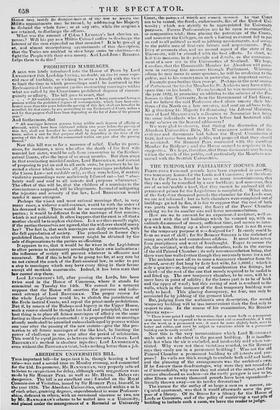THE TEMPORARY PARLIAMENT HOUSES JOB.
FORTY-FOUR thousand pounds have been expended in.proveding two temporary houses for the Lords and Ctaninons; yet the clim-
ber for the Peers is fimnd to have so many inconveniences, that they can only be remedied by a new building; and moreover, they are of so into'erable a kind, that then cannot be endured till the
permanent palace for the Legislature is completed. 1Vhat share of the finty-thur thousand pounds the chamber for the Lords cost, we are nut informed : but as both chambers were completed out of buildings gutted by fire, it is this to suppose that the cost of both was pretty much the same; the finery of the Peers' Chamber making up fur its smaller size and fewer accommodations.
How are we to account for an experieneA architect, well ae- qua'nted with the old buildings wh;ch be vamped up, with an unlimited command of money, sufficient time, and no one to inter- fete with him, fitting up a showy apartment that is not fit even for the temporary purpose it was designed for? It surely could be from no want of skill ; for Sir ROBERT SMIRKE is the architect of many rest ectable and commodious edifices. It must have arisen faint precipitancy and want of forethought. Eager to secure the job, the architect, without due consideration, roofs in the carcass of the old Painted Chamber ; its only reccommendation being, that there were four walls (rotten though they are) ready to rec. ice a roof.
The architect now offers to raise a temporary chamber from the ground, seventy feet long by !laity feet wide, for 5,000/.; which is only a quarter—or, leaving out of consideration the fittings, but a third—of the cost of the one that merely required to be roofed in and fitted up. The new temporary chamber, to be sure, will be a mere barn in point of solidity ; for the lower part is to be of brick and the upper of wood ; but this saving of cost is confined to the walls, which in the instance of the first temporary building were ready to hand. This glaring discrepancy, we fear, can only be accounted for by jobbing of the grossest kind. But, judging from the architect's own description, the second temporary building will be less inconvenient than the first only in lespect to size. In the course of his examination, Sir ROBERT SMIRKS Says- " There is one point I ought to mention, that a room built as a temporary tom must never be expected to be as conveMent and as conifortabie, if I may u.e the word, as a permanent one : it must be more slightly built, nin-t be hotter and colder, and not$t he subject to variations which in a permanent building can be easily avoided."
Now this is the very inconvenience which Lord BEOUGHAM made such an ado about in the present building. It is insuffer- ably but when the air is excluded, and intolerably cold when ven- tilated. Why were not these variat:ons avoided, as Sir ROBERT says they easily are in a permanent healing? Was not the old Painted Chamber a permanent building to all intents and pur- poses? Its walls are thick enough to exclude both cold and heat; and the planning of the arrangements was the architect's own. If he foresaw these disadvantages, why were they not remedied; or if irremediable, why were they not stated at the outset, and the carcass abandoned as useless—as the costly gewgaw is now to be, after fifteen or twenty thousand pounds have been squandered— literally thrown away—on its tawdry decorations?
The excuse for the outlay of so large a sum on a narrow, an- t:voted apartment, was that it would afterwards serve the pur- pose of a library. Of its fitness for a library for the House of Lords or Commons, and of the policy of contriving a vast pile of building to include such a room, we leave the reader to judge.


























 Previous page
Previous page